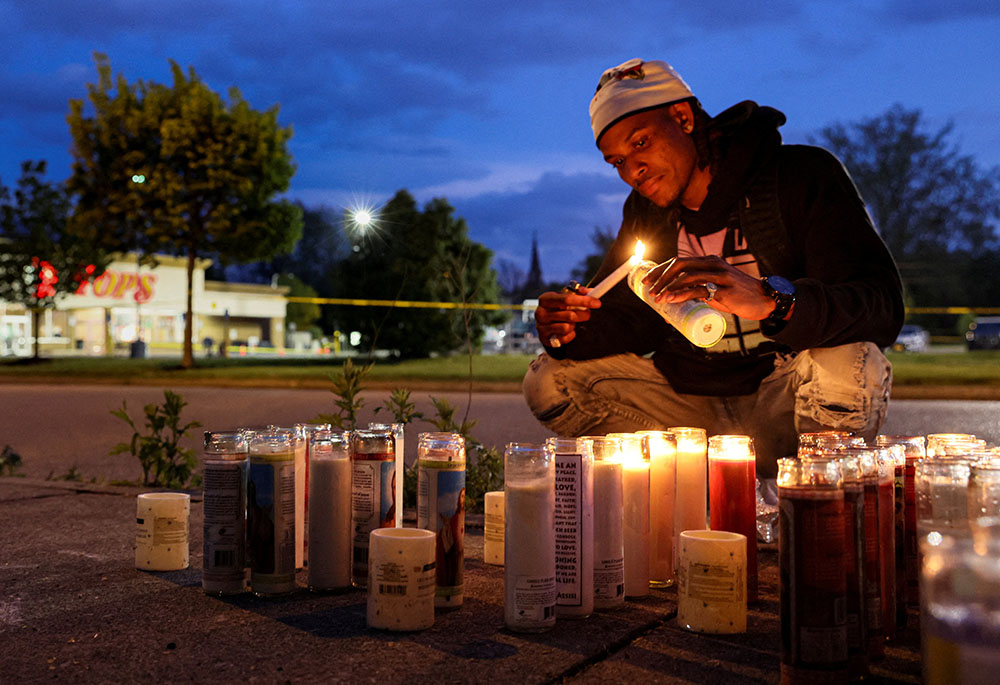
A man at a Tops supermarket in Buffalo, New York, lights a candle May 16 for the victims of a May 14 mass shooting that authorities said was motivated by racism. (CNS/Reuters/Brendan McDermid)

(GSR logo/Toni-Ann Ortiz)
As the United States reels from a racially motivated mass shooting in Buffalo, New York, the panelists for The Life joined other thoughtful people these days in considering this question:
Has your congregation or have you personally come face-to-face with your own internalized racist/caste superiority or internalized racist/caste oppression? What happened next?
______
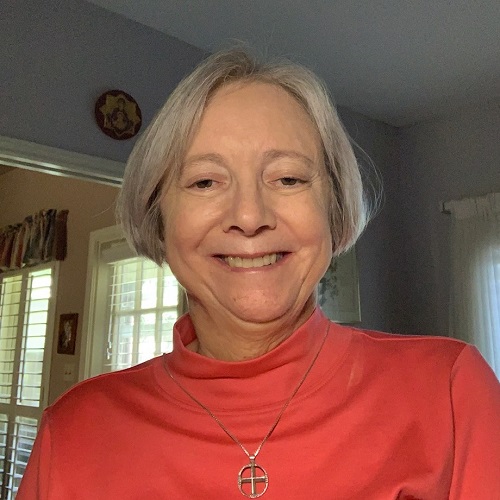 Celeste Larroque, a member of the Sisters of the Eucharistic Covenant, is a native of southern Louisiana. She has been in religious life for 47 years and currently is on her community's leadership team. She resides in Lafayette, Louisiana. A licensed clinical social worker, she has spent her career primarily in the areas of social services and psychotherapy. Currently, she is the delegate for religious in the Lafayette Diocese.
Celeste Larroque, a member of the Sisters of the Eucharistic Covenant, is a native of southern Louisiana. She has been in religious life for 47 years and currently is on her community's leadership team. She resides in Lafayette, Louisiana. A licensed clinical social worker, she has spent her career primarily in the areas of social services and psychotherapy. Currently, she is the delegate for religious in the Lafayette Diocese.
It's about the elephant in the room. Downcast eyes, a cautioning glance between acquaintances, a tightness around your heart — all responses to an inappropriate comment about race spoken out loud by another, or even me. This is Adam's sin, that inherent struggle of seeking and maintaining power over others. It is an almost-insatiable thirst for domination to the degree of subjecting others to durable submission.
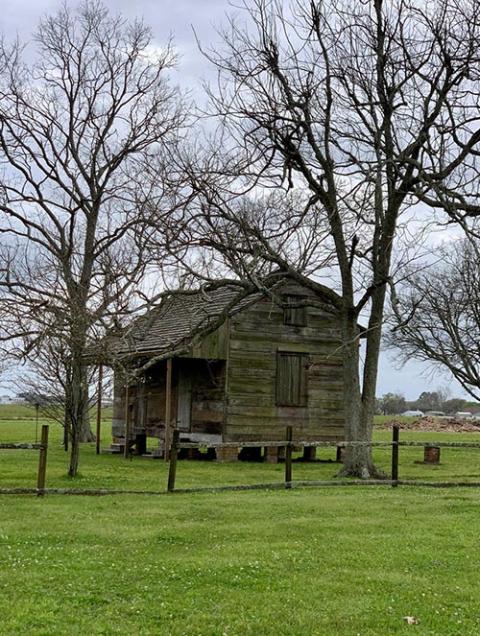
A restored tenant house on Laura Plantation in Vacherie, Louisiana. After the Civil War, many slaves remained on plantations to become tenant farmers in attempts to support their families. (Celeste Larroque)
I was born and raised in the latter days of the Jim Crow era in a small Southern village bordered by gravel roads and small-town pride. The schools were segregated, and most Black families lived "across the tracks" while white families lived along the lush, lazy bayou that snaked through town. There were Black families who lived across that bayou in tenant houses still attached to large functioning white family farms known as "plantations."
As a young white child in a white middle-class community of family and friends, the very first time I can recall the shame of white privilege is the memory of being a small child going to the doctor's office in town with my mother. I saw Black people exiting the office, but when we got to the waiting room, there were never any Black people sitting there.
When I asked my mother where they were, she whispered, "The colored people have their own waiting room."
I immediately picked up that this was not a special waiting room with sweet snacks for the kids. Right away, I knew this did not make sense, and I immediately felt something shifting deep inside my soul. This was not a rational situation. So I just kept quiet — for a long, long time. In the seeds of a small child's conscience there emerged the constant incongruity of living in a social and spiritual parallel existence within my small community.
What is the remedy to such a malady of soul and mind? I have come to know that the only remedy is hope. It is a hope that has survived the most horrifying exercises of hate and despair throughout all of history. It is a hope seen sometimes but unseen at others. But it remains. It is Easter hope. It is Jesus Christ, through his own suffering, death and rising, telling us that the hope is there, and it is everlasting. We have only to reach out for it.
Resurrection comes at a price, but the joy of Easter Sunday comes to us on the wings of hope. May our eyes and hearts forever be opened. Alleluia!
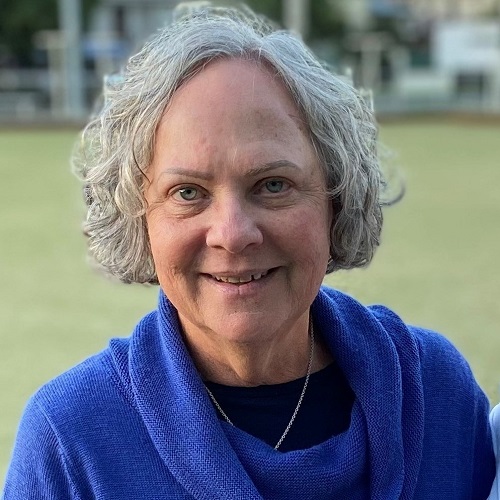 Annette Arnold is a Sister of St. Joseph of the Sacred Heart from Rockhampton, Queensland, Australia. She has an academic background in education, counseling, community development, mission studies, professional supervision and spiritual direction. She has taught in primary and secondary schools and conducted high school retreats and counseling. She has also worked as the executive office of the Brisbane Archdiocese's justice and peace commission and as the coordinator of the social action office of religious congregations. She has worked with First Nations women preparing to coordinate a safe house for victims of domestic violence and has served on her congregation's provincial and general councils and as a regional leader. She currently works in spiritual direction and professional supervision.
Annette Arnold is a Sister of St. Joseph of the Sacred Heart from Rockhampton, Queensland, Australia. She has an academic background in education, counseling, community development, mission studies, professional supervision and spiritual direction. She has taught in primary and secondary schools and conducted high school retreats and counseling. She has also worked as the executive office of the Brisbane Archdiocese's justice and peace commission and as the coordinator of the social action office of religious congregations. She has worked with First Nations women preparing to coordinate a safe house for victims of domestic violence and has served on her congregation's provincial and general councils and as a regional leader. She currently works in spiritual direction and professional supervision.
I was standing with colleagues in a line in a café, just chatting, waiting to be served. The person behind the counter singled me out and asked what I wanted. I was confused and said that there were people ahead of me on the line. The penny dropped; I was the only white person in the group. The rest were First Nations people!
This is a real and significant example of the level of racism that exists in our country.
As one First Nations member of the New South Wales State parliament said, "You don't have to scratch the surface too hard in this country to find an awful underbelly of racism." Racism, like it or not, is alive and well — and for me personally, it is an ongoing journey of conversation of heart, compassion and action.
I have lived and worked closely with Aboriginal and Torres Strait Islander peoples and have learned so much with and from them. Sometimes the journey has been full of awe and wonder, and at other times full of deep pain as I encounter the unfathomable levels of deep loss and pain: of country, culture, family, language and identity.
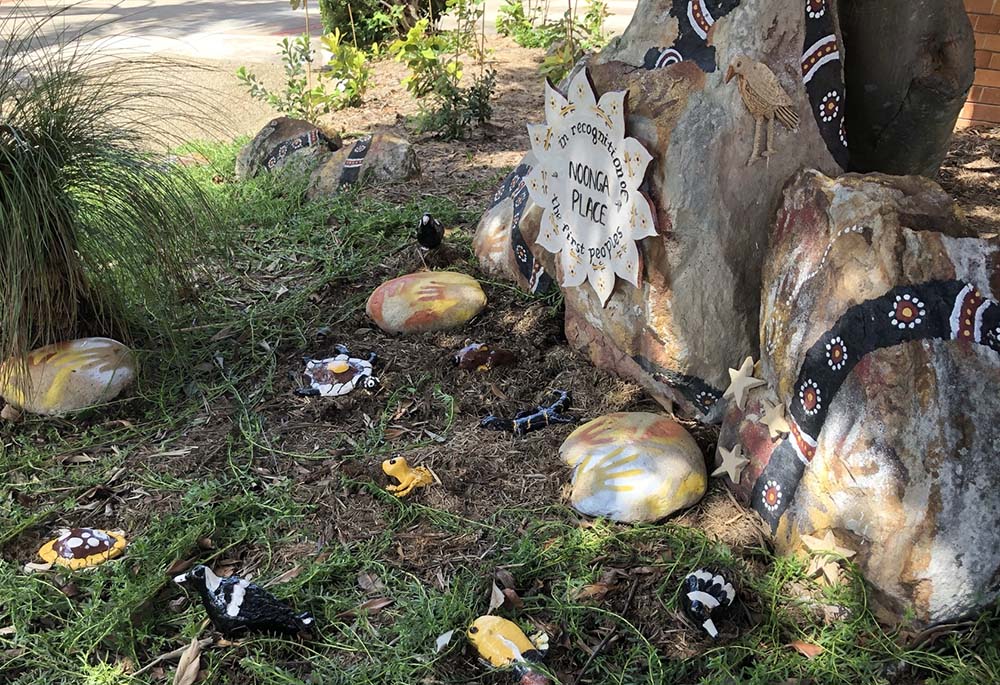
Noonga Place, the reconciliation garden in front of the regional house of the Sisters of St. Joseph of the Sacred Heart in Nundah, Queensland, Australia, is a joint project between the sisters, the local Indigenous reconciliation group, and students and staff of the college across the road. (Courtesy of Annette Arnold)
The most significant things that have taken me to deeper levels of awareness and consciousness have been the honest engagement in interpersonal relationships with individual First Nations people and the white privilege workshops in which I have participated. The knowledge gained in the workshops was critical in understanding just how tiny the number of white people are on this planet, yet we have so much unearned privilege, assets and power — and the devastating effects this has on people already suffering deeply from the ongoing impacts of colonization.
It gave me the opportunity to listen carefully to the personal stories of First Nations people and the impacts of white privilege on their lives. It called me to know and face who I really am as a white middle-class woman and invited me into deep conversion, understanding and compassion.
Over decades, the empowerment and well-being of First Peoples has been both a priority and commitment of our congregation, particularly through education at all levels, community development work, doing advocacy and lobbying in partnership and solidarity with First Nations people, and often raising our corporate voice over the serious ongoing injustices in our country.
Our sisters, too, have had many opportunities to learn, understand and face racism within, but this is a very personal invitation and call to conversion, so it is up to each one to continue to commit to that lifelong journey.
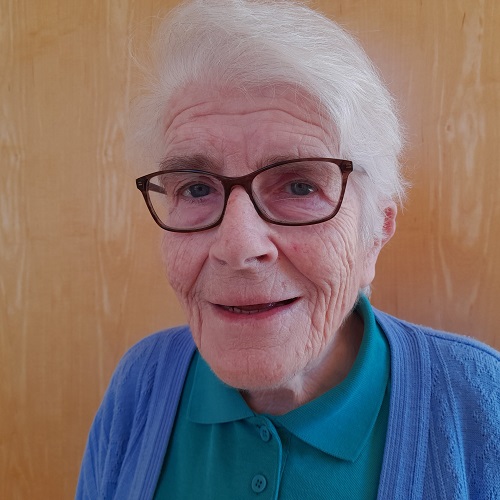 Eilis Weber is a member of the Medical Missionaries of Mary in Ireland. She ministered in Angola as a nurse/midwife and in nursing education. In Boston, she wrote newsletters and appeals to benefactors. She currently ministers at the motherhouse in Drogheda, Ireland, working with elderly sisters, staffing the switchboard, and writing for the congregational newsletter and other newspapers.
Eilis Weber is a member of the Medical Missionaries of Mary in Ireland. She ministered in Angola as a nurse/midwife and in nursing education. In Boston, she wrote newsletters and appeals to benefactors. She currently ministers at the motherhouse in Drogheda, Ireland, working with elderly sisters, staffing the switchboard, and writing for the congregational newsletter and other newspapers.
Racism has been a part of the human condition since the beginning of time. We all have internalized racism, whether we realize it or not. Divisions caused by color, race, religion, nationality: All have the potential to create havoc, often resulting in atrocious abuses of human rights and even death.
I am a member of an international congregation, the Medical Missionaries of Mary, founded by an Irishwoman, and most of our older sisters are Irish. When the congregation was founded in 1937, Ireland was a small, isolated country with little experience of other countries except as destinations for emigrating Irish. So we had little contact with other nationalities.
I grew up in Dublin. My childhood memories were generally happy ones except for one thing: My elders indirectly made it clear that everything English was bad — the country, the people, the music, everything! I hardly knew where England was, but as a child, I believed anything I was told.
If an international rugby match was being broadcast on the radio and England was playing, as soon as "God save the Queen" (the English national anthem) came on, our radio was turned off and only turned back on when the match started. I worried about my uncles, Paddy and George, who worked over there, wondering how they were surviving in that "terrible" country. The why of this antagonism was never really explained.
Advertisement
Fast-forward a number of years. Horror of horrors, I acquired an English brother-in-law! He and my sister lived in England, so I only saw them once or twice a year. When I did meet him, he seemed to be a really nice person with a gentle manner, a sense of humor, and — when the children arrived — a wonderful father. I presumed he was the exception.
Some years later, I entered an international congregation and now lived with sisters of different nationalities, including English. Again, I was in for a surprise: These sisters were nice, especially one who was in the novitiate with me. By now, I was an adult and realized that my understanding of Ireland's next-door neighbor was appallingly wrong.
But how could it be otherwise? How does a country oppressed unjustly by a foreign power for many years come to terms with its past? One denies or ignores it at one's peril. Facing it with dignity and objectivity, focusing on the positive and trying to see a broader picture helps. Forgiving those who unjustly offended is of course the answer but is not always easy.
However, it is important to engage in the process, regardless of what aspect of racism we are trying to change.
I now try to respect all people with whom I come in contact, avoiding generalizations and presumptions. I also include in my prayer both the perpetrators and the victims of racism.
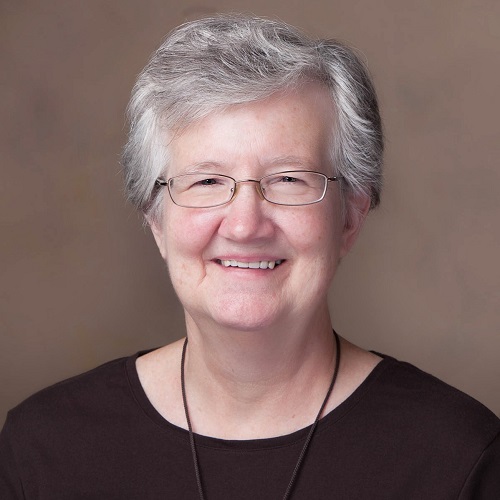 Maryann Agnes Mueller is a Felician Sister of North America. Before her entrance into the congregation, she worked as a dietician and research tech in cholesterol metabolism. Later, she worked as a certified diabetes educator and taught science in high school. Now, she serves as the full-time justice and peace coordinator for the Felician Sisters of North America in Enfield, Connecticut, and edits the congregational justice and peace newsletter. She serves on several boards; among them is U.S. Catholic Sisters Against Human Trafficking, for whom she publishes the Stop Trafficking Newsletter.
Maryann Agnes Mueller is a Felician Sister of North America. Before her entrance into the congregation, she worked as a dietician and research tech in cholesterol metabolism. Later, she worked as a certified diabetes educator and taught science in high school. Now, she serves as the full-time justice and peace coordinator for the Felician Sisters of North America in Enfield, Connecticut, and edits the congregational justice and peace newsletter. She serves on several boards; among them is U.S. Catholic Sisters Against Human Trafficking, for whom she publishes the Stop Trafficking Newsletter.
On the day that George Floyd was arrested and murdered, Amy Cooper, a white woman, walked her dog without a leash in Central Park in New York. When asked by Christian Cooper, a Black man who was in the park bird-watching, to leash her dog as required by law, Amy placed a call to 911, reporting that an African American man was threatening her: "There is an African American man — I am in Central Park — he is recording me and threatening myself and my dog. Please send the cops immediately."
Christian recorded the events on his cellphone, and the video soon went viral.
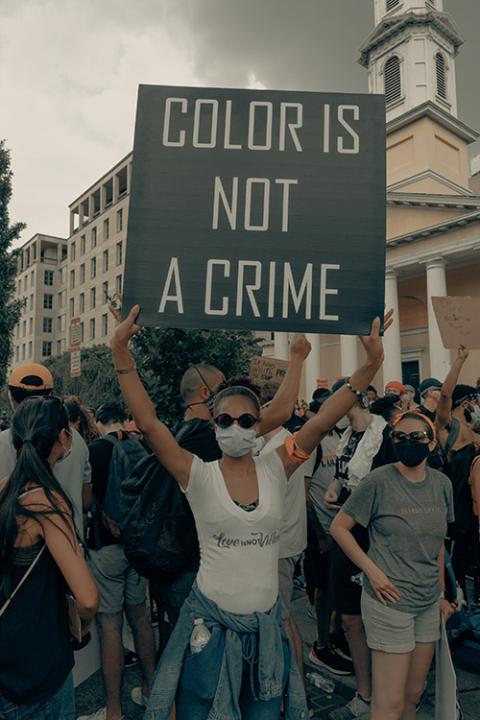
Woman holds up sign at a Black Lives Matter protest in Washington, D.C., June 6, 2020. (Unsplash/Clay Banks)
Looking at that video, I found myself rooting for Christian and was relieved when Amy was later charged with filing a false police report. However, at the end of the video, I paused and stared at the computer screen. In my heart and stomach, I knew that I saw a little of myself in Amy Cooper.
In the weeks that followed, I realized how subtle my complicity could be concerning racism as I paid attention to my feelings of superiority or thoughts of "othering" another human being. I realized how much I had adapted to thinking that supports the status quo of white privilege.
Over the years, I have read books on racism and even initiated online book discussions around Jim Wallis' book America's Original Sin. I thought I knew about and acknowledged racism as systemic injustice, but I was largely unconscious of how deeply the normalcy of white superiority is embedded in my consciousness.
Since the summer of 2020, I have intentionally looked for opportunities to participate in small-group discussions online with those of other cultures and allow myself to lean into my discomfort and stay engaged in the often-challenging conversations. At times, I force myself to keep quiet and listen, acknowledging this is partly out of fear of opening my mouth, saying something inappropriate or perhaps hurtful.
I recognize that I need God's help to help me listen to other voices. When I reflect upon what I have heard, I can then confront my resistance to change and growth, again only with God's help.
Finally, I know I can only help dismantle racism by calling it out in myself. To quote James Baldwin, "Not everything that is faced can be changed, but nothing can be changed until it is faced." I pray for the courage not to be silent in the face of injustice and to take action to defend the dignity of all my brothers and sisters.
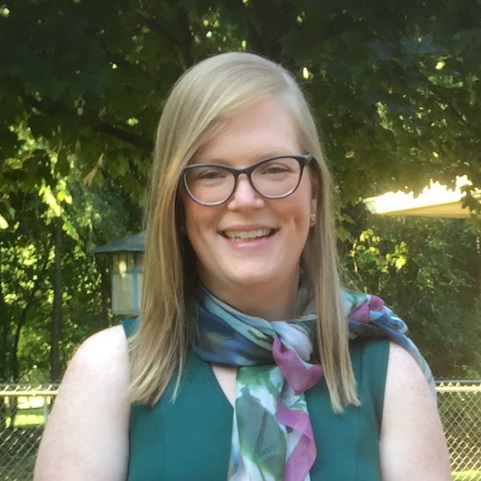 Jane Aseltyne is in first vows with the Sisters, Servants of the Immaculate Heart of Mary in Monroe, Michigan. Before entering, she served as the communications manager at A Nun's Life Ministry and worked in various ministries focused on disenfranchised populations, including teenagers and the elderly. Currently, she is a graduate student at Catholic Theological Union in Chicago, pursuing a master's degree in systematic theology and spirituality, and is involved in the Together Program, an intercultural cohort of young women religious who are studying at Catholic Theological Union and living in community.
Jane Aseltyne is in first vows with the Sisters, Servants of the Immaculate Heart of Mary in Monroe, Michigan. Before entering, she served as the communications manager at A Nun's Life Ministry and worked in various ministries focused on disenfranchised populations, including teenagers and the elderly. Currently, she is a graduate student at Catholic Theological Union in Chicago, pursuing a master's degree in systematic theology and spirituality, and is involved in the Together Program, an intercultural cohort of young women religious who are studying at Catholic Theological Union and living in community.
As a white woman in a predominantly white congregation, it is not only critically necessary but part of our own prophetic calling as religious to confront the sin of racism. For many congregations, that means reexamining our history, and for my congregation in particular, that starts at our very foundation.
Our co-founder, Theresa Maxis Duchemin, was the daughter of a Haitian woman and an English man. She was a founding member of the Oblate Sisters of Providence, a congregation established by women of African descent. While serving as superior, she was approached by Louis Florent Gillet, a Redemptorist priest, who invited her to establish a new community in Michigan that would become the Sisters, Servants of the Immaculate Heart of Mary.
Unsure if the Oblates would survive because of the oppressive racism within both church and civil society, Maxis left the Oblate Sisters of Providence in search of a more stable religious life. She was light-skinned and could pass as white, especially in a place where no one knew her heritage.
No one, that is, except Bishop Peter Paul Lefevère of Detroit. Lefevère welcomed a group of teaching sisters in his diocese, and so he tolerated Maxis. Yet, surviving documents reveal Lefevère's disdain for people of color. And eventually, so did his actions. He increasingly placed restrictions on Maxis and even appointed a priest as director-superior of the community over Maxis. Eventually, she was forced to leave Monroe.
Maxis lived for a time in the Immaculate Heart of Mary missions in Pennsylvania, which later became the separate foundations of Scranton and Immaculata. Angry about these missions outside of his diocese, Lefevère officially dismissed and banned Maxis from the Monroe foundation, forbidding the Monroe IHMs from contacting or even mentioning Maxis or their Pennsylvania sisters.
Because of the suppression, Maxis' role as co-founder of the IHMs, along with Gillet, was not acknowledged by the Monroe IHMs until the 1940s, when historian Immaculate Heart of Mary Sr. Rosalita Kelly wrote our history. With a renewed understanding of Maxis as co-founder, the Monroe IHMs joined with the other two Immaculate Heart of Mary congregations to continue unearthing the true story of our foundation. We have worked closely, too, with the Oblate Sisters of Providence.
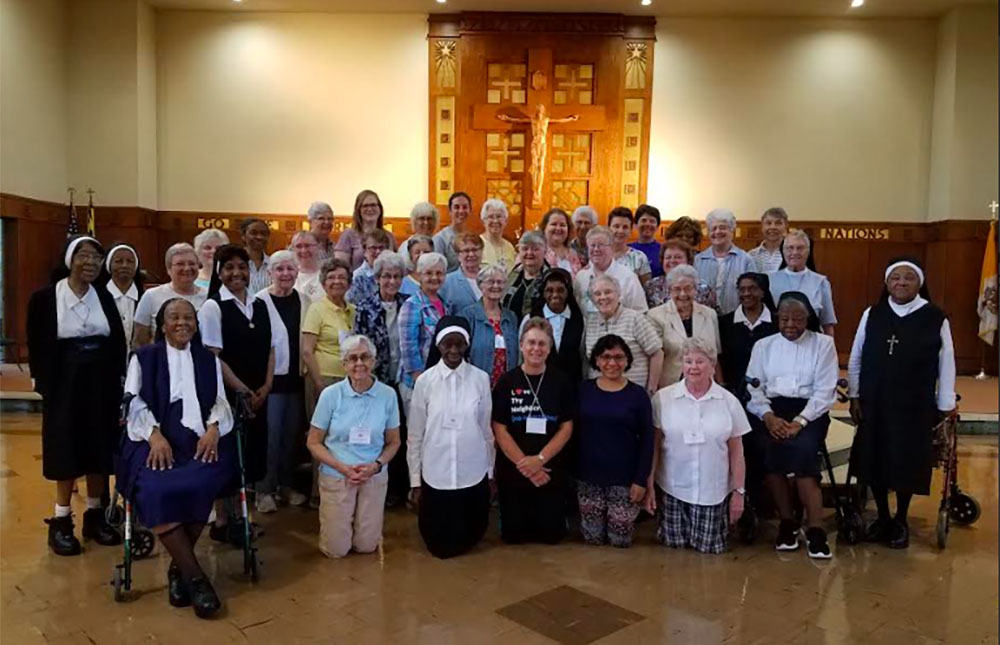
Participants at the 2019 Healing Racism Workshop of the Oblate Sisters of Providence and the Sisters, Servants of the Immaculate Heart of Mary (Courtesy of Jane Aseltyne)
For our mostly white IHM congregations, facing our racism has been a big first step, but certainly not our last.
Every few years, the two communities gather for a Healing Racism workshop in which we share our stories and listen deeply to one another, including the great suffering caused by our racism. The 2019 workshop challenged me to continue to confront my racism and acknowledge how my skin color allows me to occupy spaces freely in stark contrast with the reality for our sisters of color.
Dismantling racism is an urgent necessity, and it begins at home in our own hearts and in our congregations. Corporate statements are important, but they are not enough. We must put our words into action. We must be true to the prophetic call of religious life. If we are not willing to tell the truth about our racist history, attitudes and behaviors, how can we call ourselves prophetic?







